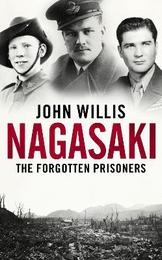
|
Nagasaki: The Forgotten Prisoners
Hardback
Main Details
| Title |
Nagasaki: The Forgotten Prisoners
|
| Authors and Contributors |
By (author) John Willis
|
| Physical Properties |
| Format:Hardback | | Pages:384 | | Dimensions(mm): Height 216,Width 135 |
|
| Category/Genre | Oral history
Second world war |
|---|
| ISBN/Barcode |
9781912914425
|
| Classifications | Dewey:940.542522440922 |
|---|
| Audience | |
|---|
|
Publishing Details |
| Publisher |
Mensch Publishing
|
| Imprint |
Mensch Publishing
|
| Publication Date |
2 August 2022 |
| Publication Country |
United Kingdom
|
Description
This is one of the most remarkable untold stories of the Second World war. At 11.02 am on an August morning in 1945 America dropped the world's most powerful atomic bomb on the Japanese port city of Nagasaki. The most European city in Japan was flattened to the ground 'as if it had been swept aside by a broom'. More than 70,000 Japanese were killed. At the time, hundreds of Allied prisoners of war were working close to the bomb's detonation point, as forced labourers in the shipyards and foundries of Nagasaki. These men, from the Dales of Yorkshire and the dusty outback of Australia, from the fields of Holland and the remote towns of Texas, had already endured an extraordinary lottery of life and death that had changed their lives forever. They had lived through nearly four years of malnutrition, disease, and brutality. Now their prison home was the target of America's second atomic bomb. In one of the greatest survival stories of the Second World War, we trace their astonishing experiences back to bloody battles in the Malayan jungle, before the dramatic fall of Fortress Singapore, the mighty symbol of the British Empire. This abject capitulation was followed by surrender in Java and elsewhere in the East, condemning the captives to years of cruel imprisonment by the Japanese. Their lives grew evermore perilous when thousands of prisoners were shipped off to build the infamous Thai-Burma Railway, including the Bridge on the River Kwai. If that was not harsh enough, POWs were then transported to Japan in the overcrowded holds of what were called hell ships. These rusty buckets were regularly sunk by Allied submarines, and thousands of prisoners lived through unimaginable horror, adrift on the ocean for days. Some still had to endure the final supreme test, the world's second atomic bomb. The prisoners in Nagasaki were eyewitnesses to one of the most significant events in modern history but writing notes or diaries in a Japanese prison camp was dangerous. To avoid detection, one Allied prisoner buried his notes in the grave of a fellow POW to be reclaimed after the war, another wrote his diary in Irish. Now, using unpublished and rarely seen notes, interviews, and memoirs, this unique book weaves together a powerful chorus of voices to paint a vivid picture of defeat, endurance, and survival against astonishing odds.
Author Biography
John Willis, author of Nagasaki: The Forgotten Prisoners, is one of Britain's best known television executives. He is a former Director of Programmes at Channel 4 and Director of Factual and Learning at the BBC. He was Vice-president of National Programs at WGBH Boston. In 2012 he was elected as Chair of the British Academy of Film and Television Arts (BAFTA). He is currently Chair of Mentorn Media, producers of Question Time for BBC and he also chairs the Board of Governors at the Royal Central School for Speech and Drama. He divides his time between London and Norfolk.
ReviewsIn nearly 40 years of exposure to written and broadcast testimony of what happened in Japan...I don't think I've ever been given such a vivid and persistent impression...spoken with eloquence and obviously deep feelings. * Sunday Telegraph * Remarkable story, more dramatic and horrific than any TV dramatisation. * Daily Mail * This well-timed and brilliant documentary was a fitting reminder of not only the sacrifices but the horrors of war. * Yorkshire Post * Vividly real and down to earth, told in an unembellished way it was more persuasive than a thousand shrill anti-nuclear slogans. * Daily Mail * These homely, ordinary men described the destruction with a dreadful precision. * Daily Express *
|